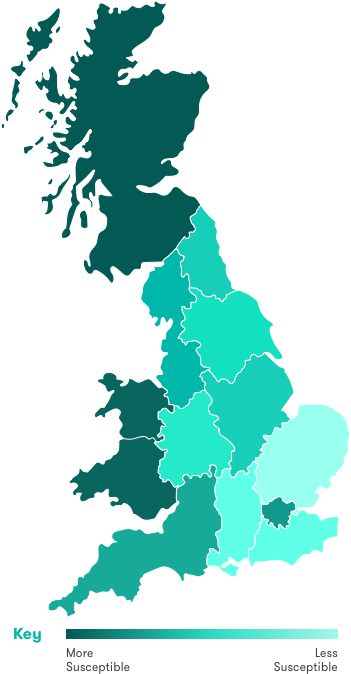Mapping Seasonal Affective Disorder in the UK
Which of the UK’s regions could be the most susceptible to Seasonal Affective Disorder? View yorktest’s research below.

We noticed you are from the US…
& being directed to our UK site
Use code USA10 at checkout
Which of the UK’s regions could be the most susceptible to Seasonal Affective Disorder? View yorktest’s research below.

| Ranking | Region |
|---|---|
| 1st | Scotland |
| 2nd | North Wales |
| 3rd | South Wales |
| 4th | London |
| 5th | South West |
| 6th | North West |
| 7th | East Midlands |
| 8th | North East |
| 9th | Yorkshire & The Humber |
| 10th | West Midlands |
| 11th | South East |
| 12th | East |
With the clocks having recently changed, we’re set to see hours of sunlight decrease across the UK, which can be a contributing factor for SAD, but which regions of the UK might be most susceptible to the disorder? Through compiling data on mental health and sunlight hours, the table above orders the areas of the UK that may be the most susceptible to seasonal affective disorder.
The research for this piece consists of data sourced from ONS and Met Office on:

On the topic of reducing susceptibility to seasonal affective disorder, we caught up with Lee Chambers, Environmental Psychologist and Wellbeing Consultant at Essentialise.
Here are his recommendations:
We are still in the early days of understanding the complexity of SAD, but what we do know is that it is intrinsically linked to our light exposure, our biorhythms and our hormone levels. With that in mind, the ways we can reduce our susceptibility to SAD is to consider getting light therapy to stimulate our serotonin production in the morning, and to get outside during natural light hours where we can.
Ensuring you get as much natural light into the room you are working from is also beneficial, while getting out in nature can also help to boost our mood and protect us against stressors. Exercising is another way we can promote mental wellbeing while eating a nutritious diet is essential as the majority of our serotonin production is in our gut.
Finally, trying to get a quality night of sleep also helps with emotional and hormonal regulation, so having an optimal evening routine and sleep environment is beneficial to reducing the impact of SAD. And don’t forget in these challenging times we face, ensure you’re getting your dose of social connection and relaxation, disconnecting from all the news and media that is so often negative.
Interested in how the above results are calculated, and the data points included? We used data from ONS surveys and Met Office on:
Mental wellbeing – This was scored on a 35-point scale using The Short Warwick–Edinburgh Mental Well-being Scale. Participants score themselves 1-5 over 7 questions related to wellbeing. The closer the score to 35, the more positive a subject is feeling.
Sunshine hours – this is the average monthly sunlight hours per UK region over the Winter months, taken from Met Office
PHQ8 score – This is known as a Patient Health Questionnaire score, and is used to measure severity of depressive disorders in clinical study. The score for this was taken during the height of the COVID-19 pandemic, which will likely have had an impact on this score. Higher scores indicate higher severity of depressive disorders (taken from ONS).
Percentage of the population reporting heightened anxiety – this is taken from a study from ONS where adults aged 16 and over were asked to rate their anxiety levels on a scale of 0 to 10 where 0 was very low and 10 was very high. The percentages in this column represent the percentage of people scoring above a 1 on this scale.
The scores for the above by region can be found in the below table. We used this to feed an overall calculation to generate the ranked table at the top of this page.
Scroll horizontally to view the whole table.
| Region | Mental wellbeing Score out of 35 | Sunshine hours | PHQ 8 Score | % of population with anxiety |
|---|---|---|---|---|
| North East | 24.84 | 58 | 5.1 | 57.2 |
| North West | 25.23 | 52 | 5.1 | 56.5 |
| Yorkshire and The Humber | 25.02 | 63 | 5.1 | 59 |
| East Midlands | 25.19 | 57 | 5.1 | 57.7 |
| West Midlands | 25 | 51 | 5.1 | 57.1 |
| East | 25.5 | 55 | 5.1 | 57.2 |
| London | 25.16 | 62 | 5.1 | 64.4 |
| South East | 25.47 | 63 | 5.1 | 60 |
| South West | 25.28 | 59 | 5.1 | 60.1 |
| North Wales | 25.1 | 52 | 6.5 | 58.9 |
| South Wales | 25.1 | 59 | 6.5 | 58.9 |
| Scotland | 25.27 | 43 | 6.5 | 58.4 |
| Northern Ireland | 25.61 | 49 | 58.9 |

Seasonal Affective Disorder (SAD), also known as ‘Winter depression’ affects 1 in 3 people in the UK. Common symptoms related to SAD are lethargy, low mood, food cravings and irritability amongst others. Whilst seasonal affective disorder can affect people throughout the year, it’s common to see symptoms worsen in the Winter months. No definitive cause for seasonal affective disorder has been identified, but there are a number of potential factors such as imbalances in serotonin or melatonin, as well as interference with your body clock*.
The importance of your mental health can’t be understated. If you’re suffering from symptoms of seasonal affective disorder, we’d recommend that you speak to a medical professional or utilise a service such as the NHS urgent mental health helpline.
*https://www.nhs.uk/conditions/seasonal-affective-disorder-sad/
* YorkTest provide laboratory test results and nutritional support services for informational purposes only and are not a substitute for professional medical advice. The results provided cannot be used to diagnose, treat or cure medical or health conditions. YorkTest has 40 years of experience in food intolerance testing and food allergy testing, optimising health and wellbeing with our range of health tests. The term “food intolerance” is used broadly to reflect that IgG antibody reactions to foods are measured by the YorkTest laboratory. These “food intolerance” tests are not allergy, lactose intolerance or coeliac tests. YorkTest recognise that food-specific IgG test results cannot be used to diagnose, treat or cure any specific food intolerances. YorkTest also recognise that the link between raised food-specific IgG levels, gut health and specific symptoms is not well understood and for this reason YorkTest always provide a Nutritional Therapist consultation to help guide an elimination diet. If you are concerned about your symptoms then please contact your GP. Information on this website is for educational purposes only and you must never disregard professional medical advice or delay in seeking it based on the information provided. 82% of customers reported that their YorkTest Laboratories test had a positive impact on their health and wellbeing. Figure taken from STRAT7 researchbods survey 2021 (n=565).